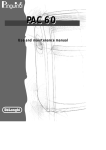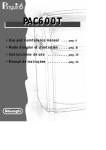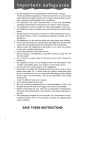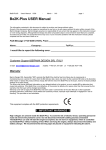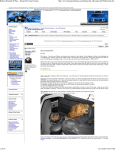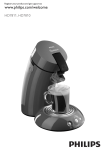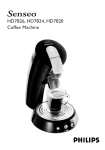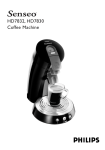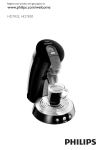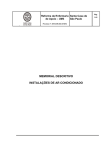Download DeLonghi PAC60 Instruction manual
Transcript
PA C 5 0 Use and maintenance manual D ear Customer, Thank you for having purchased an appliance made by De’ Longhi, the international leader in portable air conditioning units. Thanks to our years of experience all around the world we are constantly improving the quality and performance of Pinguino. We are confident that you will be satisfied with your purchase and enjoy the cool comfort created by the Pinguino for many years to come. You should spend some time reading this instruction manual and keep it handy to refer to in order to use your Pinguino efficiently. 2 De s c r i p t i o n 2 1 8 7 3 9 6 10 4 5 12 11 Control panel 16 18 19 20 21 24 13 14 15 17 22 23 Accessoires 25 26 28 29 27 31 30 I m p o r t a n t s a f e g u a rd s • Use this appliance only as described in this instruction manual. As with any electrical appliance, whilst the instructions aim to cover as many eventualities as possible caution and common sense should be applied when operating and installing this air conditioner. • This appliance has been manufactured to cool and de-humidify domestic environments and should not be used for other purposes. • It is dangerous to alter or modify the unit's characteristics in any way. • The appliance must be installed in line with the relevant national legislation. • Should repairs be necessary, contact the nearest authorised Repair Service Centre. Unauthorised servicing can be dangerous. • This appliance is to be used by adults only; keep away from children. • In the case that the power cable becomes damaged, this must be substituted only by specialised personnel authorised by the manufacturer. • Always ensure the appliance is earthed. If you have any doubts check with a qualified electrician. • Avoid using extension leads with the unit. • Before cleaning or maintenance operations, always unplug the unit from the socket. • Do not pull on or place strain on the power cable when moving the appliance. • The appliance should not be installed where the atmosphere may contain combustible gases, oil or sulphur, or near heat sources. • Do not rest hot or heavy objects onto the appliance. • Remember to perform the descaling procedure at the end of each season (see page 13). In areas where the water is particularly hard (rich in minerals), the use of a commercial anti-lime product added to the water is recommended. This can be requested from De’Longhi LTD. • Clean the filters at least once a week. • Avoid using heaters near the unit. • The unit should be transported in a vertical position. If this is not possible secure the unit at an angle, do not lie horizontally. • Before transporting the unit drain the condensation collecting-tray and tank. After transportation, wait at least 1 hour before switching on the unit. • The packaging materials can be recycled. You are therefore recommended to place them in the special containers for differentiated waste collection. 4 How does your Pinguino work D uring the summer, optimum comfort is achieved with a temperature of around 24 °C and 50% relative humidity. An air conditioner removes moisture and heat from the room where it is located. One advantage of portable air conditioning units over fitted models is that they can be moved from one room to another in the home or even transferred between different buildings. The hot air in your room is passed through a coil cooled by refrigerant gas, removing excess heat and moisture before being discharged again into the room. In single unit models, a small amount of this air is used to cool the refrigerant gas, then the hot and moist air is discharged outside. For more details, contact or visit our Internet site www.delonghi.com 5 Setting up The following instructions will help you set up your air conditioning unit as efficiently as possible. AIR CONDITIONING WITHOUT INSTALLATION FOR INSTANT TEMPORARY USAGE With just a few simple operations, Pinguino will restore comfortable conditions in your room: • With a double casement window, use the suckers 28 provided to hold the two halves of the window together (fig. C). • Fix the exhaust hose 26 to the coupling 10 on the back of the unit as shown in figure A. 1 2 C A For optimum results: • Fix the window attachment 27 to the end of the hose 26 . • Place the unit near a window French window or door. • Open the window, French window or door slightly and place the window attachment 27 as shown in figure B. B • If you have a sash window, place the bracket 31 on the window sill, extend the bracket fully within the window frame, fix the bracket by turning the wing nut and lower the window onto the bracket. Insert the window attachment 27 of the exhaust hose 26 into the slot, then connect the hose to the air conditioner (fig. C1). Thanks to the wing nut, it’s possible to use the window bracket also for sliding windows. Position the hole of the bracket so to allow a correct installation of the exhaust hose (see the following instructions). C1 6 Setting up AIR CONDITIONING WITH INSTALLATION For more efficient use Pinguino can also be semi-permanently installed 30 cm • Fit the flange 25 supplied to the hole. • Fix the hose 26 to the coupling on the back of the unit (figure A). • Attach the end of the hose 26 to the flange 25 as shown in the figure E. E MAX 120 cm 30 cm MIN 30 cm To install, proceed as follows: • Make a hole in a outside wall or through the glass of a window. Check the height and dimensions given in figure D When the hose 26 is not attached, close the hole with the bung on the flange 25 . 106 NOTE: When the unit is installed semi-permanently, we recommend leaving a door slightly open (1 cm is enough) to ensure an adequate exchange of air. in a window pane D in the wood sill of a window in the wall: for optimum results, insulate the section of the wall with suitable insulating material. 7 Pre p a ra t i o n f o r u s e HOW TO USE THE AIRCONDITIONER WITH WATER These air conditioners can use both air and water to cool the condenser (the hot part) of the air conditioner. To utilise the full potential of your air conditioner, the tank 6 needs to be filled with water. The water is used. To increase the cooling power and reduce the noise level and energy consumption of the air conditioner. The water that is used in then expelled from the machine as water vapour through the exhaust hose 26 (it does not go into room). Always use clean top water (which doesn’t contain salts). As a rule the water will usually last about 8 hours however this depends on the conditions within the room, such as temperature, humidity, insulation and aspect and number of people. In turbo mode the water will also be used more quickly. You may also use the airconditioner on air cooling only (without filling the water tank . If you only require the lower cooling power. 2 A) To open the front panel 3 grip either side of the panel and gently pull the panel towards you and upwards. Remove the tank 6 Lifting it forward. B) Turn the tank upside down and remove the plug, remove the extendible tube and fill the tank, leaving it on the ground. C) After completing the filling procedure, replace the extendible hose, replace the cap and screw it in tightly. Return the tank to its place, with the writing FRONT clearly visible. Carefully hold the panel in the centre and lower to its closed position. During the "water functioning" operation and in particularly silent locations (eg the bedroom) a slight gurgling sound may be heard. This is completely normal. IN HIGH HUMIDITY CONDITIONS Water is extracted from the air in the room, this water is also used to cool the condenser. When the humidity is particulary high an excess of water may buid up in the internal tank. This can be drained by removing the bung from the drain hose 11 and draining into a suitable receptacle. IMPORTANT: if the room temperature is 32°C or over the airconditioner must be operated with with water in the tank. 8 Turning on and setting the timer ELECTRICAL CONNECTION Before plugging in check that: • the mains supply corresponds to the power supply shown on the rating plate; • the socket and the mains lead correspond to the power requirements of the appliance; • the socket is suited to the plug, otherwise have the socket replaced; • the socket is properly grounded. The manufactures cannot be held responsible for any damages due to failure in following normal safety procedures. SETTING THE TIMER (if supplied) The programmer/timer 16 , like all clocks, must be set to the exact time. If for example it is 4.00 pm. (16.00), turn the dial in a clockwise direction (following the direction of the arrow) until the number 16 is lined up with the triangular pointer (the arrows indicates 4:00 P.M. approximately ). 21 20 1) Set the operating times by pushing out the notches on the dial corresponding to the period required (each notch represents 15 mins.) 2) Press the TIMER key 15 , the signal light 17 will come ON. 3) Make sure that the timer indicates the coroperating time Funzionamento 21 20 19 16 Replacement of the power cable must be carried out by qualified personnel. PROGRAMMED MODE rect time (see instructions on setting). 4) Select the desired function as shown in the chart overleaf. N.B.: To override the programmed operating times, simply press the ON/OFF key 15 (the timer signal lamp ON will go out) 19 16 pointer N.B.: Never turn the dial in an anti-clockwise direction! The timer is in effect, an electric clock and works only if the plug is connected to the power supply. Whenever the plug is disconnected or there is a power failure, the programmer stops (the clock is then “slow”) and must be re-set. 9 Selecting functions AIR CONDITIONING FUNCTIONS VENTILATION/FILTRATION To turn the unit on in air conditioning mode, proceed as follows: Rotate the function selector 22 clockwise. 1. Press the button 14 (the signal light “I” 13 will come on). 2. Rotate the function selector 22 dial anticlockwise: • Place the large star symbol in line with the reference mark to operate the unit in air conditioning mode at maximum fan speed (the signal light 24 will come on, and then, after 3 minutes the signal light 18 will come on ). • Place the small star symbol in line with the reference mark to operate the unit in air conditioning mode at minimum fan speed (the signal light 24 will come on, and then, after 3 minutes the signal light 19 will come on ). 3. Now set the required temperature by rotating the room thermostat dial 23 . Note The temperature is not expressed in degrees. We recommend that you turn the thermostat dial to the maximum position. When the desired room temperature has been reached, slowly turn the thermostat in a clockwise direction until it arrives at the position where a click can be heard. The signal lights 24 and 18 (or 19 ) will turn off. The temperature selected in this way will automatically be regulated and maintained, and save energy. When regulating the thermostat, the air conditioning function is temporarily interrupted and the unit continues to operate in fan only mode. In this way, the appliance keeps the air temperature within the room even. Delay on Start Up 1. A special safety device will delay the start of air conditionig by approximately 3 to 5 minutes when switching between functions or on initial start up. 2. You may also experience a slight delay between changing from one function to another. 10 • Press the button 14 (the signal light “I” 13 will come on). • Place the large symbol in line with the reference mark to operate the unit at maximum fan speed. (the signal light 21 will come on). • Place the small symbol in line with the reference mark to operate the unit at minimum fan speed. (the signal light 20 will come on). PURIFICATION FILTER In addition to dust, this purification filter is able to capture even the smallest sized particles and impurities (up to 0.003 millimetres), such as cigarette smoke. The purification filter should never be used with the dust filter, which is also included with the appliance. Therefore: A. If you wish to use the purification filter: Remove the purification filter from the filter housing; Remove the aspiration grill 8 (fig. G on page 12) and the dust filter which is attached to this. Remove the purification filter from its packaging. Anchor the filter to the appliance by attaching the two plastic pieces on the filter to the special supports on the air conditioner (see the illustration below). Set the dust filter aside. B. If the dust filter is sufficient: Remove the purification filter from the filter Recommendations RECOMMENDATIONS Follow these recommendations to achieve maximum efficiency from your air conditioning unit: • Make sure there are no heat sources in the room. • Do not use outdoors. • Close the doors and windows in the room where the unit is functioning. The only exception is in the case of installation through a hole in the wall or window. In this case, you are recommended to allow a small amount of air to enter through a door or window to guarantee an adequate exchange of air. close doors and windows window to guarantee an adequate exchange of air. • Protect the room from direct exposure to the sun’s rays by drawing the curtains and/or partially lowering the blinds so as to maximise energy savings. • Do not rest objects on the air conditioning unit. • Do not obstruct the air intake 8 or outlet 2 . lower the blinds or draw the curtains do not cover • Make sure the unit is located on a level floor. If necessary, place the two blocking devices 29 under the front wheels . 11 Maintenance Before cleaning or maintaining the unit, always turn the unit off by releasing the button 14 and unplug from the mains . CLEANING THE APPLIANCE We recommend cleaning the appliance with a slightly damp cloth then drying with a dry cloth. For safety reasons, do not wash the air conditioner with water. Precautions Never clean with benzene, alcohol or solvents. Never spray liquid insecticide or similar. CLEANING THE FILTERS Dust filter Purification filter Clean the external side of the purification filter once a week. Use a vacuum cleaner at an intermediate power level. Never clean the inside of the filter. Replace the purification filter at the end of each season or in any case, when it is no longer effective. The purification filter can be purchased in the store as an accessory or at an Authorised Service Centre as a replacement part. Alternatively, the dust filter included with the appliance may be used in place of the purification filter. CLEANING THE RESORVOIR All of the models are equipped with a dust filter able to capture the dust particles suspended in the air. In order to maintain the effectiveness of your air conditioner unaltered over time, remember to clean the dust filter every two weeks. 1. Remove the aspiration grill 8 , (see fig. F); 2. Remove the filter holder housing by detaching it from the external grill. To detach it, press on the two wings found on the side of the filter holder (see fig. G) Use a vacuum cleaner to remove the dust deposits on the filter. If the filter is very dirty, 5 It is recommended that you clean this at least once a month using the following method: • turn off the appliance and remove the plug from the electrical outlet. • open the front panel 4 and remove the tank 6 . • remove the bung from the drainage hose 11 which can be found at the back the air conditioner and empty out the water to a container. • after draining off the water, replace the drainage hose plug. • remove the dirt by scrubbing gently with a cloth where the tank is positioned. START OF SEASON CHECKS Check that the power cable and socket are undamaged and that the earth installation is efficient. Carefully observe the installation 2 1 instructions. fig. F immerse it in warm water, rinsing it thoroughly. The temperature of the water should be kept under 40°C. After washing it, let the filter dry before reinserting it into the holder. fig. G 12 RECOMMENDED OPERATIONS TO PERFORM AT THE END OF THE SEASON 1) Proceed with scaling procedures (see page 13). 2) Remove the water from the collection reservoir 5 . 3) Operate the appliance in the ventilation only mode for about half an hour in order to thoroughly dry the inside of the air conditioner. 4) Turn off the appliance and remove the plug from the outlet. 5) Remove the drainage hose 26 . 6) Clean the filter and dry it thoroughly before replacing it in the appliance. 7) Cover the appliance so that dust does not build up. De s c a l i n g When the scale deposits become excessive (on average, after about 400 hours of operation) or in any case, at least once each season, it is very important to proceed with the decalcification of the appliance as described below. To remove the scale from the appliance, you need: • 250 ml of descaling liquid 30 • 750 ml of clean water (corresponding to a diluted solution of 75%) fig. H Proceed as follows: 1) Remove the tank 6 from the appliance and drain the water remaining in the collection reservoir 5 by using the drainage hose 11 (fig. H). 2) Close the drainage hose 11 . Pour 250 ml of decalcifying liquid and 1 litre of clean fig. I water into the collection reservoir 5 which is found under the tank (fig. I), on the bottom of the appliance. 3) Operate the air conditioner for about half an hour. 4) After this, drain out all of the liquid remaining in the collection reservoir and rinse thoroughly. During the rinsing process, the drainage hose must be open and the appliance functioning. 5) Unplug the appliance from the mains and clean the collection reservoir thoroughly with a clean cloth. 6) After cleaning the collection reservoir, the air conditioner can be used normally. IF TRACES OF SUDS CAN BE SEEN IN THE WATER WHEN THE MACHINE IS USED AGAIN AFTER IT HAS BEEN CLEANED AS DESCRIBED ABOVE, THIS IS NORMAL HOWEVER, IF THERE ARE A LOT OF SUDS RINSE THE APPLIANCE AGAIN THOROUGHLY TO REMOVE ALL TRACES OF CLEANING PRODUCT. REQUEST ADDITIONAL QUANTITIES OF DECALCIFYING LIQUID FROM DE' LONGHI LTD. ATTENTION: The use of products other than De' Longhi could cause damage to the internal components of the appliance and invalidate the terms of the warranty. 13 Troubleshooting If the unit is not working properly, this may be due to small problems that you can easily resolve yourself. Follow these instructions carefully before contacting your local Authorised Technical Service Centre. PROBLEM CAUSE The air conditioner is • completely turned • off the air conditioner is on (signal light 13 ) • but the appliance doesn't start The unit works but does not cool the room • • plug in wait The teeth of the timer are in the rest mode • proceed with a new setting of the timer three minutes have not passed since it was • turned on • • windows open a heat source is operating in the room (burner, light, etc.) or there are a lot of people the air outlet hose has come detached from the coupling thermostat adjusted too high air filters clogged the output of the unit is insufficient for the conditions or size of the room • • • 14 it is not plugged in there is no electricity • • The unit works for only a short time REMEDY • • wait three minutes (safety device) before the appliance start cooling. close the windows eliminate heat sources • fit the hose in the coupling • • lower the thermostat clean/replace filters • • there is a kink in the exsaust hose the exsaust hose is blocked • • • • there are too many curves in the outlet tube the fan is blocked • • position the exaust hose correctly check there are no blockages preventing the discharge of air to the outside rearrange the hose correctly contact the Service Centre Technical specification TECHNICAL SPECIFICATION Power supply see rating plate Max. absorbed power in air conditioning “ Refrigerating capacity “ Refrigerant “ Number of fan speeds Max. air flow . RECOMMENDED OPERATING CONDITIONS Room temperature 21 ÷ 32°C Dimensions: • width • height • depth 2 3 370 m /h 580 mm 785 mm 435 mm This appliance contains substances which, if released into the atmosphere, would damage the ozone layer. Care should therefore be taken not to perforate the refrigerant circuit. At the end of its working life, delivery the air conditioning unit to a special collection centre. 15 De Via Longhi L. 31100 tel. fax S.p.A. Seitz, Tre v i s o 47 Italia +39/04224131 +39/0422413647 w w w. d e l o n g h i . i t 5751005800/06.01
















